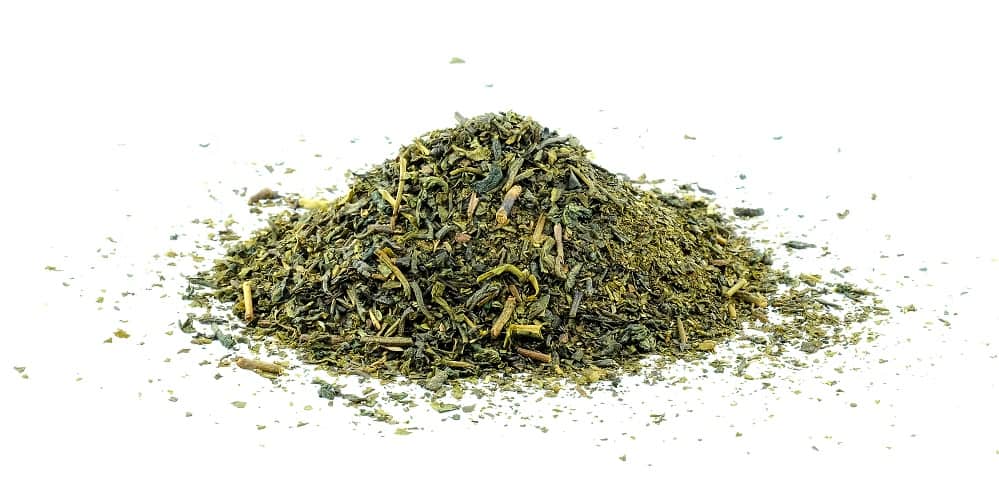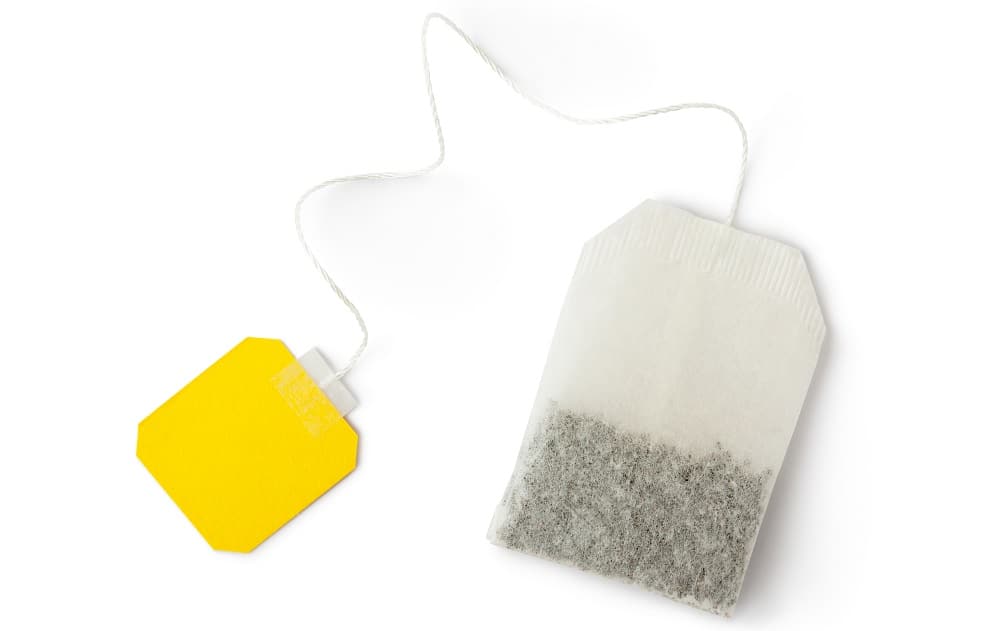Possibly tracing back to the Tang Dynasty (618–907 AD), green tea is one of the most popular beverages in the world. Despite being primarily made from one single species of plant, different varieties and growing conditions of the plant as well as different methods of preparation have developed several different types of green tea.
With a rich history and a long list of health benefits, green tea is vegan as its only ingredient comes from the leaves of the tea plant, Camellia sinensis.
However, there are some things to consider for green tea to be truly vegan such as ingredients added for flavor, the use of tea bags, and where/how the green tea was sourced.
Table of Contents
Green Tea

Green tea is made from the tea plant, Camellia sinensis. Conventionally, green tea is prepared by steeping the tea leaves in hot water. While green tea can be prepared using loose leaves, it is much more common to prepare green tea that comes in tea bags (1).
Green tea has an extensively rich history, particularly in China. It is also an especially important element in traditional Chinese medicine. Namely, green tea is suggested to provide a wide array of health benefits such as improved cognitive function, weight loss promotion, antioxidants, and prevention of ailments such as diabetes and cardiovascular diseases.
Depending on how the plants were grown, when the leaves were harvested, and how the leaves were processed, green tea can be sub-categorized into a wide array of different types.
Is Green Tea Vegan?
Loose leaf green tea is vegan since it is made from the leaves of the tea plant.
The problem with most green tea is that it is sold as tea bags both domestically and internationally. The tea bag acts like an infuser and makes drinking tea more convenient.
The Problem with Tea Bags

The issue is that most green tea is made usable via tea bags. There are a couple of reasons for why tea bags are problematic, namely what the tea bags are made of.
Most tea bags are made of food-grade plastics, particularly polypropylene which is non-biodegradable. A landmark study found that a single plastic tea bag can release approximately 11.6 billion micro-plastics and 3.1 billion nano-plastics into a single cup (2). This has several implications for both public health and the environment.
These microscopic plastics have been studied to be able to interfere with the body’s endocrine system, the organ system responsible for hormones. Through a number of mechanisms, endocrine disrupting chemicals (EDCs) have been linked to several types of cancer, including prostate, breast, and thyroid (3).
Micro-plastics have also been found to be highly detrimental to the environment. Various marine organisms have been documented to ingest micro-plastics to the point of toxicity (4). Furthermore, the ingestion of micro-plastics introduces harmful effects of plastic into the intricate food web as the micro-plastics make their way to the top.
Tea bags can also be made from silk – the natural fiber produced by silkworms. Since silk is sourced from animals, it's considered non-vegan.
The convenience of green tea in tea bags is evident when it comes to the preparation of loose leaf green tea. The loose leaves are placed inside an infuser which is then placed inside a cup, mug, or tea pot – followed by the addition of hot water. For people without infusers, they can steep the loose leaves in hot water and strain the leaves afterward.
Tea and Human Rights Violations
Ethical vegans extend their beliefs beyond that of dietary vegans and also take into account how the tea was sourced. Tea has a deep history of exploiting child labor.
The US Department of Labor recognizes the use of forced labor and/or child labor in the tea industry of Kenya, Malawi, Rwanda, Tanzania, and Uganda. Reports of forced labor have also been received from Bangladesh, Cameroon, Eritrea, and Sri Lanka (5).
Ethical veganism stems from the protest for animal rights. Over the years, this has expanded to include fighting for human rights as well.
This same sort of exploitation exists in the cocoa industry as well.
Common Ingredients Added to Green Tea
Since green tea is a popular beverage all over the world, it comes as no surprise that different cultures and preferences prepare their green tea differently from one another.
Some people add different ingredients to alter the flavor of the green tea to their liking. However, a majority of additives are problematic for vegans.
Sugar
Many people find tea to be more palatable when added with sweeteners. Especially in the United Kingdom, it is common for people to add sugar to their green tea.
However, vegans are often concerned about sugar. While sugar comes from plant sources, the production of sugar typically utilizes animal bone char (charred and powdered animal bone) for refinement.
Learn More: Is Sucralose Vegan?
Honey
Compared to sugar, experts suggest that adding honey is a healthier alternative. However, honey is non-vegan since it's sourced from bees.
Milk
Milk is another popular ingredient often added to green tea. Like honey, milk is non-vegan as it is sourced from animals. However, this can easily be replaced with vegan alternatives such as almond milk and soy milk.
Creamer
Instead of milk, some people prefer to add coffee creamer to their green tea. However, most creamers are non-vegan since they contain milk. Vegans are advised to look for creamers labeled as “vegan” because non-dairy creamers can still be non-vegan. According to the FDA, milk derived proteins can be present in a product and be considered non-dairy.
Final Thoughts
While there seems to be a number of things to consider, the easiest way to consume green tea in a vegan manner would be to simply use loose leaf green tea that is sourced from countries that do not use unethical labor.
Furthermore, vegans can also find many ingredients they can add to green tea to their own liking such as citrus, ginger, mint, almond milk, and more.
References
3. https://www.sciencedirect.com/




